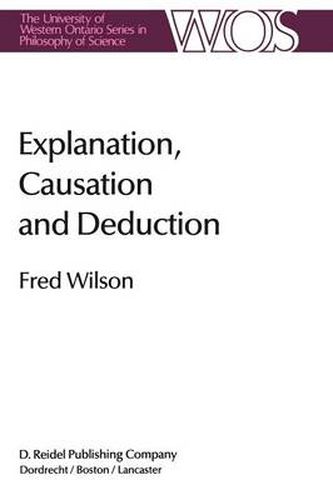Readings Newsletter
Become a Readings Member to make your shopping experience even easier.
Sign in or sign up for free!
You’re not far away from qualifying for FREE standard shipping within Australia
You’ve qualified for FREE standard shipping within Australia
The cart is loading…






This title is printed to order. This book may have been self-published. If so, we cannot guarantee the quality of the content. In the main most books will have gone through the editing process however some may not. We therefore suggest that you be aware of this before ordering this book. If in doubt check either the author or publisher’s details as we are unable to accept any returns unless they are faulty. Please contact us if you have any questions.
The purpose of this essay is to defend the deductive-nomological model of explanation against a number of criticisms that have been made of it. It has traditionally been thought that scientific explanations were causal and that scientific explanations involved deduction from laws. In recent years, however, this three-fold identity has been challenged: there are, it is argued, causal explanations that are not scientific, scientific explanations that are not deductive, deductions from laws that are neither causal explanations nor scientific explanations, and causal explanations that involve no deductions from laws. The aim of the present essay is to defend the traditional identities, and to show that the more recent attempts at invalidating them fail in their object. More specifically, this essay argues that a Humean version of the deductive-nomological model of explanation can be defended as (1) the correct account of scientific explanation of individual facts and processes, and as (2) the correct account of causal explanations of individual facts and processes. The deductive-nomological model holds that to explain an event E, say that a is G, one must find some initial conditions C, say that a is F, and a law or theory T such that T and C jointly entail E, and both are essential to the deduction.
$9.00 standard shipping within Australia
FREE standard shipping within Australia for orders over $100.00
Express & International shipping calculated at checkout
This title is printed to order. This book may have been self-published. If so, we cannot guarantee the quality of the content. In the main most books will have gone through the editing process however some may not. We therefore suggest that you be aware of this before ordering this book. If in doubt check either the author or publisher’s details as we are unable to accept any returns unless they are faulty. Please contact us if you have any questions.
The purpose of this essay is to defend the deductive-nomological model of explanation against a number of criticisms that have been made of it. It has traditionally been thought that scientific explanations were causal and that scientific explanations involved deduction from laws. In recent years, however, this three-fold identity has been challenged: there are, it is argued, causal explanations that are not scientific, scientific explanations that are not deductive, deductions from laws that are neither causal explanations nor scientific explanations, and causal explanations that involve no deductions from laws. The aim of the present essay is to defend the traditional identities, and to show that the more recent attempts at invalidating them fail in their object. More specifically, this essay argues that a Humean version of the deductive-nomological model of explanation can be defended as (1) the correct account of scientific explanation of individual facts and processes, and as (2) the correct account of causal explanations of individual facts and processes. The deductive-nomological model holds that to explain an event E, say that a is G, one must find some initial conditions C, say that a is F, and a law or theory T such that T and C jointly entail E, and both are essential to the deduction.